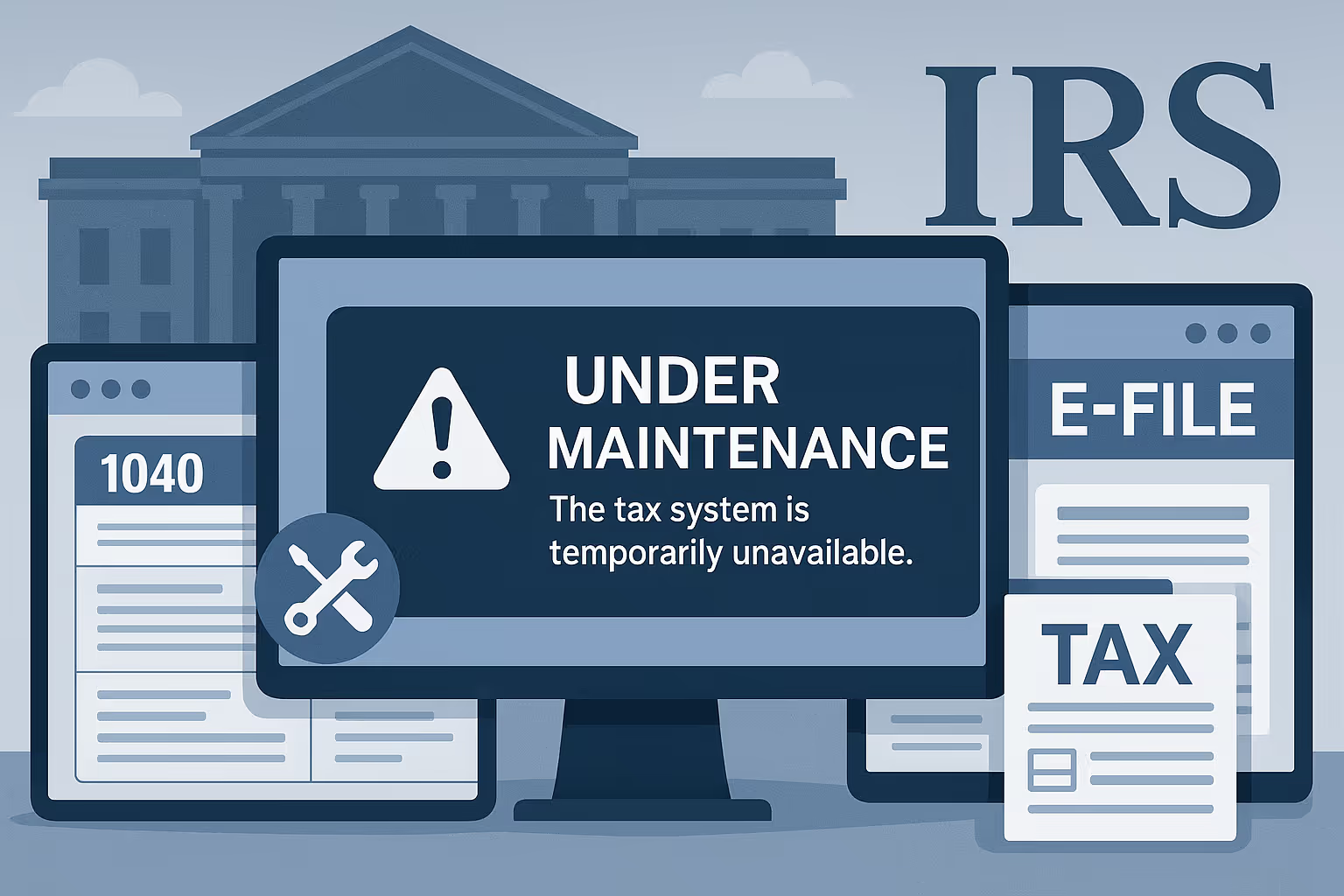IRS Planned Maintenance to Affect E-File and Online Tax Systems



The Internal Revenue Service (IRS) has announced that planned maintenance will temporarily affect several online platforms, including the Modernized e-File (MeF) system. The routine work, part of the agency’s modernization efforts, will cause scheduled e-file shutdowns and limited service windows, potentially affecting individual and business tax returns.
The IRS has confirmed that its Modernized e-File (MeF) system—the backbone of electronic tax filing—operates under a recurring maintenance cycle. During these windows, users may continue to submit returns, but acknowledgments and certain functions are delayed until full service resumes.
The IRS e-Services platform and related online tools are unavailable on Sundays from 12:00 a.m. to 4:00 p.m. Eastern Time. This affects tax professionals who rely on the system to file forms, access client data, and verify taxpayer identification numbers.
The modernized e-File (MeF) platform itself runs on a different schedule. On Sundays from 12:00 a.m. to 8:00 a.m. Eastern Time, the system accepts submissions, but acknowledgments are not issued until processing restarts. The IRS has noted that returns or forms sent during this window are safely queued and later processed without additional taxpayer action.
The agency also conducts shorter nightly updates, usually lasting 15 minutes near midnight, to keep systems current. Taxpayers are advised to avoid time-sensitive transactions during these periods and to check operational pages labeled “page last reviewed or updated” for the most recent system notices.
The IRS describes its recurring maintenance as essential for ensuring the reliability of its digital infrastructure. As the modernized e-File system handles most federal returns, the agency prioritizes regular updates to strengthen security, improve processing speed, and prepare for each new tax year.
The MeF system supports millions of individual and business tax filings annually. By temporarily limiting service, the IRS can upgrade servers, apply software patches, and confirm that transmissions are being correctly processed. These steps allow the agency to issue accurate acknowledgments once the systems reach full capacity.
While taxpayers can still paper-file their forms, the IRS emphasizes the advantages of e-file submissions, which are faster and less error-prone. Planned downtime supports this long-term shift from paper to a fully digital platform. System notices, often marked as “last reviewed or updated” on IRS.gov, confirm that the updates are complete.
The IRS also conducts checks through its Assurance Testing System (ATS), a platform that allows tax software developers and professionals to test electronic submissions before each tax year. The agency explains that ATS ensures returns can be transmitted and processed correctly in the live MeF system once filing season begins.
Through assurance testing, developers verify that their products meet IRS standards, reducing the risk of rejected returns during the filing season. This step is critical for both business and individual submissions, as it prevents system errors and ensures smoother operations during January’s high-volume period.
The IRS states that regular assurance testing is part of broader modernization goals, including strengthening security and improving user access. Notices on IRS.gov marked “page last reviewed” help professionals confirm the most recent updates and instructions for using the system.
The IRS advises both business and individual taxpayers to plan for scheduled downtimes. Most outages occur during low-traffic hours, but if they are attempted during a maintenance window, they can still delay business tax returns, payments, or transcript requests.
The MeF system accepts returns during maintenance, though acknowledgments are held until processing resumes. This can create short-term uncertainty for professionals who rely on immediate confirmation after submitting a form.
During peak filing periods, such as January, brief shutdowns may disrupt schedules, especially in high-volume states like California. The IRS recommends professionals prepare early, avoid last-minute submissions, and check IRS.gov notices marked “page last reviewed or updated” for the latest status.
The IRS posts maintenance updates, instructions, and system notices on its official pages, often labeled “page last reviewed or updated” for confirmation. Taxpayers should check these resources before filing to avoid delays during shutdown periods.
Key links:
Advance notifications are also available through IRS QuickAlerts, helping professionals track submissions and system availability.
By William Mc Lee, Editor-in-Chief & Tax Expert—Get Tax Relief Now